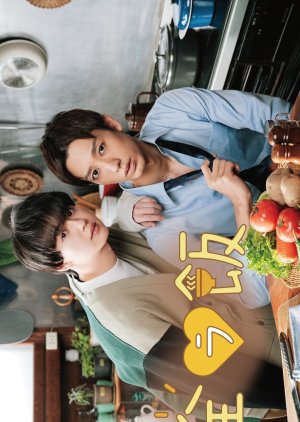Esta resenha pode conter spoilers
Poderia ser bemmmm melhor
Sinceramente, achei esse plot um pouco estranho, com pontos positivos, mas a coisa de tudo girar na problemática de comer pelado é demasiado sem nexo, tendo em vista que Ichijo vive sozinho. Fora isso, a série é interessante até a página 2... tudo é bem fofo, fácil se apegar aos protagonistas, aliás, fiquei muito feliz com a presença de Yutaro, ele é um excelente ator em todos os papéis que se propõe a fazer. A avó era uma maravilhosa, até triste saber que tudo aconteceu por ela ter morrido, se ela estivesse viva com certeza shiparia o casal rsrsrs. A questão da culinária sempre me pega, acho maravilhoso, cultural e respeitoso quando se mostra a culinária de um lugar numa série.Se eu for procurar pontos negativos, digo que a presença da garota é totalmente desnecessária e foi colocada apenas para criar um enredo de separação do casal como conflito final, mas não faz sentido Ichijo simplesmente depois de ter se declarado e até beijado Mahiro propor um relacionamento a ela, e mais vergonhoso ainda foi ela aceitar, pois sabia que seu rival era outro homem.
Enfim, o plot poderia ser melhor, mas todos os demais aspectos técnicos são ok, inclusive cenários e ambientação me surpreenderam pela qualidade e beleza. É uma série que eu indico, mas não assistiria de novo por não ter me prendido tanto, mas com certeza não é das piores histórias que já vi.
Esta resenha foi útil para você?
Plot set-piece driven rather than character-driven
Any story needs to be about characters, and the plot driven by the characters. What I mean by that is that a characters' nature or past trauma, etc. needs to drive how they behave and and react to things. For example, if a character was bitten by a dog as a child, he may have an irrational fear of dogs - and maybe falls in love with a vet. That's organic drama rather than artificial external crises or relying on very implausible misunderstandings, which is one of the laziest sins in writing.The way characters behave in this series make no emotional sense, because the author wants to get from point A to point B, and so that determines how the characters behave. Points A & B were almost always just tired cliches that were not integrated into the plot and did nothing to advance it but were rather just there to be there. A couple of examples:
- The Past Connection. This appears to be irresistable to BL writers (actually a lot of Asian drama genres) - a past connection between Souta and Mahiro serves no plot purpose - it's just there to be there, and as a result it leads to Souta implausibly not remembering Mahiro, because if he did remember him, that would complicate the plot. And so he doesn't.
- The Restraining Hug Fom Behind. Mahiro thinks Souta is leaving, but it turns out that instead he's staying forever. Does that make him happy? No, he gets upset and tries to leave. Why? Why would that upset him? It wouldn't. But then Souta wouldn't need to grab him from behind to prevent him from leaving.
- The Implausible Misunderstanding. Souta drives four hours from Tokyo and arrives at just the precise moment - it couldn't be one second earlier or one second later or the misunderstanding wouldn't have happened - to see Souta hug his boss, who Souta assumes is Mahiro's boyfriend, despite the fact that he knows them both, the boss has actively encouraged Souta to be with Mahiro, there is zero evidence that they're dating, and it was clear Mahiro was upset, so it is clearly a comforting hug, not a romantic one. But the writer needed to insert the next cliche, and so Souta has to misunderstand, and for no apparent reason decides to become the boyfriend of...
- The Interfering Woman. Ugh. I don't even want to dwell on this, but it chews up an enormous amount of runtime.
The end result is two unrelatable and unpleasant characters who behave inconsistently and are annoying.
The acting is OK. The Souta actor is pretty good, Yutaro is one-note and has no presence or charisma. There is almost no chemistry whatsoever. Mahiro behaves like the wife of an alcoholic in an abusive relationship - he actually recoils from Souta every time they're near each other, and he just looks afraid all the time. Souta manages to express some repressed longing, but it's still not convincing. There is no romantic chemistry between them, and certainly no romance. They barely even touch each other, at least not on purpose.
A positive is it's well-filmed and the setting in the countryside is lovely. Well, Souta gets naked sometimes, and he has a nice body, so there's that, I guess.
Another positive is the Taiwanese store owner, who is an appealing character and causes a plausible (!) misunderstanding when he reads a note that contains kanji characters that mean "former coworker" in Japanese, but mean "ex-lover" in Mandarin, which leads to the series' best comic moment.
Overall this was a total waste of time, and a disappointing squandering of an interesting premise and a strong start. But it goes nowhere, is frustrating to watch, and is way too long for the amount of "plot" in it. I would skip it.
Esta resenha foi útil para você?

started well, went downhill at ep 6
Overall: somehow an awesome slice of life/cooking/comedy series devolved into cliched plot points. My advice is to watch episodes 1-5 and then episodes 11 & 12. 12 episodes about 20 minutes each, aired on GagaOOLala.Content Warnings: past death not shown, non con kiss, slap
What I Liked
- funny moments (the undressing, the van driving off, that look and the crow sounds at the end)
- realistic reaction to an accidental fall and catch
- cooking/the food looked delicious
- Mahiro's friend/coworker (wish we had seen more of that love story in the present)
- the villagers (much rather have had more screentime with them)
- Mahiro supportive of the naked dining
- managed to subvert something in ep 11 but it was due to (yet another) miscommunication
Room For Improvement
- they used cliched plot points including poor communication in order to drive the plot (and how in the final episode do they still have terrible communication skills)
- I ended up disliking Mahiro, wish they showed more in the flashbacks so we'd understand Mahiro better because he seemed very selfish and immature
- Souta was too dumb, at first I thought it was a bit endearing but they pushed it into the unbelievable area
- the pacing could have been better, I think 8 or 10 episodes instead of 12, plot went in circles, why on earth did episode 12 start 1 week after episode 11
- the non con kiss and slap both felt dated and not needed
- comedy mostly vanished
- odd things: why is the house just sitting there for 6 months? why did he have that band aid, they could have easily shown him find it as he went through those boxes, the boss and wife took a train how far for dinner? that potential buyer was oversharing to fit the plot, what was with that thing with the grandma? at the end
- based on the title, I expected a certain scene and I'm disappointed we didn't get to see it
- so she's all good now with dating the boss???
Esta resenha foi útil para você?

Esta resenha pode conter spoilers
Also known as Love, Life And Liberation
You might enjoy if you like character-based angst that's well acted, food tidbits from various cuisines, and can find satisfaction in a romance with physical attraction that doesn't actually get physical beyond holding hands.It's helpful to watch through the credits to the end of each episode because sometimes there's a bit more to see (often a flashback to high school)!
General Spoilers below.
Love, Life And Liberation is a much more fitting title. The title Naked Dining is completely misleading. This is a very PG romance and the only "kiss" is a slight press of lips while one of them is mostly asleep. Even so, the growing mental and physical attraction is felt, especially from Sota. And that's important because he's the character that didn't know he could be attracted to men, and so him falling for Mahiro as more than a friend is believable. It does not feel like "just a bromance" as some other JBL series with similar character progressions do.
Sota's confusion and progression of feelings for Mahiro were well-paced and very believable. His missteps while he struggles with that and his fear of losing Mahiro's friendship may be messy but are understandable.
Mahiro runs away from things a lot, even (or especially) things that he wants, which at first kind of irked me until I thought more about it. It's an instinctive defensive mechanism for fear; to avoid disappointment, rejection, or negative judgment. While this can be frusterating for the audience, there are people who really do behave this way. Mahiro's hesitancy and fear are noticeable even in the high school flashbacks so it seems life has reinforced this response in him. And I can understand him not wanting to be a sexuality "experiment" for the person he's in love with.
There are a LOT of misunderstandings, but they are also at least fundamentally understandable. What's different in this series is that the characters do actually try to communicate with each other! But often their fears lead them to either put on a brave face or to filter what the other person is saying to match what they *expect* to be said. This type of thing actually happens a lot in real life, so even though the misunderstandings are drawn out dramatically, it didn't annoy me too much because I could understand the progression. And the misunderstandings here really have a cascading effect. (They do get resolved satisfactorily.)
The actors were great, especially Kondo Shori as Sota. They made me smile and also tugged so hard at my heartstrings that I teared up. The secondary characters are well acted and likeable too.
The series is character-focused without much plot. I was really happy that they made 12 episodes (20-25min each) instead of 10 because the character and relationship arcs felt complete. The last few episodes didn't feel rushed like many 10 episode BLs do.
The cinematography was good and the music was okay but not memorable.
It left me feeling very satisfied and I could see myself watching this again at some point. Sota's character arc was especially well acted and I'll want to see that again.
Esta resenha foi útil para você?
"Poor Chemistry and Poor storyline"
Okay so I usually don't write reviews but with this one I had to like I just made an account here to tell people DO NOT WASTE YOUR TIME. When I first started it, I was so interested because it was a new storyline and felt nice to watch. The food representation is on point. I liked the cinematography. As the show went on, I started to question what am I seeing? And why am I wasting my time on it? This kept on disappointing me with every episode after the 5th epi. The storyline was being dragged, poor chemistry between the leads. It was so bad oh my god. I am kind of angry that why did I waste so much time on it thinking it will get better. The show lost the whole storyline as it went on and on. The only thing I liked was the food representation of different countries and spicies that's it. Ngl it felt like a forced bl😭😭😭😭😭(Ps. Sorry for being so mean but that's just how I feel)
Esta resenha foi útil para você?

You don’t always need an eventful plot…
... and I wish writers would keep that in mind from time to time. I honestly wish they removed all the pointless, ridiculous and frustrating misunderstandings and just gave us a slow burn slice of life and two people getting closer to each other as they simply spend quality time cooking.It was so enjoyable at first. And then all the unnecessary tension, annoying supporting characters and lack of communication happened and I gave up.
Sure, the acting was great, but the characters were just so frustrating to follow, the performance could not save it. Does not matter how tasty the dish might look, when it’s not actually tasty.
Overall, this is for sure a ship. It does not really work as romance nor a slice of life.
Esta resenha foi útil para você?

What a bummer!
THIS is the type of story that should be finished within 6-8 eps with 15 min runtime. There's nothing to follow. Mediocre storyline, acting, full of cliche tropes mixed with unnecessary misunderstandings... ughhh.Overwhelming beginning gradually concluded an underwhelming ending. Totally wasted my time, wish I could get back my precious time.
If you have nothing else to watch, you're bored to death, have only one show available to watch, then you can watch this series.
I'm angry (ง •̀_•́)ง!!!
Esta resenha foi útil para você?

Esta resenha pode conter spoilers
Food & Travel
Drama titles and posters. It just sometimes drives me mad that the producers of dramas do not put in a better effort into naming and illustrating their creation. I do not know haw many times I was so pleasantly surprised at a drama with an ugly poster(Tsuiraku JK) or un incomprehensible title (Hot Stove League). This one is another example. It should have been called Our Food Journey To Love or something like thatThis drama should not have been named Naked Dining because it evoked in viewers concepts and ideas that were nowhere to be found here! The ratings are low here because the majority of watchers were expecting a lot of naked frollicking but there is not even a kiss in this romcom! Naked dining is just a quirky habit the ML has to release the stress: it has no incidence on the plot other than that it is the source behind the first misunderstanding which starts the ball rolling. Immediately afterwards, cooking takes the stage and stays in the center!
ML, Sota, is an intelligent, competent, overworked civil servant who likes eating ramen et midnight, after work, naked. One day he receives a letter from his recently deceased grandmother and goes finally to visit her house. There he meets the local fruit&veg store owner, Mahiro who was close to his grandmother. Sota found the grandmother's notebook with recipes from all over the world (she could not travel due to illness and decided to travel through cooking) and decides to try them all out as a tribute to her. Mahiro helps him cook and they fall in love.
The drama deals with a lot of themes: workplace induced stress, family relationships and the lack thereof, and finally sexual orientation. Sota works too much and the weekend trips to his grandmother's house for cooking lessons are making him realize that there is more to life than just work. He has always worked too much, so much so he had never been in love so when he starts developing feelings for Mahiro, he does not understand them. On the other hand, Mahiro has had a crush on Sota since high school but thinks that Sota is straight so does nothing which confuses poor Sota even more. There are a lot of misunderstandings but when you look at the path that both characters needed to go over it is understandable that they are afraid to say anything in order not to lose the fragile friendly relationship they developed! Slowly, with the accidental help from friends and coworkers, they eventually really talk to each other are meet in the middle of the path.
There are some great support characters in this drama: coworkers and villagers and as per usual in a japanese drama, not an evil character in sight! Even those who might have been turn out to be nice and misunderstood!
The actors were fine and had a correct chemistry. Even though I am not a fan of height difference, it was not too bad since there was no skinship at all involved so it was not too blatant! The cinematography was classical and since it was filmed in autumn or winter, everything was gray and rather depressing: the colour was definitely missing. Hair styling leaves a lot to be desired: practically the complete cast has bad hair!
The drama reminded me a lot of the korean BL Love Tractor but as a much more interesting version especially since the adults were behaving as adults here and not like immature kids in adult bodies as in korean bl! Actually, this is what the korean bl should have been like and it was not!
I enjoyed very much this drama about self discovery and realisation of one's dreams! A lovely drama featuring some mouthwatering dishes!
Esta resenha foi útil para você?

Pulled at heart strings but no romance
This story could have been interesting, especially by the title alone. Yet, it managed to be simply another trope-filled cliché-injected cute story that had little plot and no romance to it. And the whole notion of ‘naked dining’ ending up simply being a ‘red herring’. It was a weak affectation of a main character used once or twice in this series but adding nothing to the story or its plot. That is too bad as that whole concept was an interesting notion and could have been a uniquely individual characteristic that could have been more greatly explored as part a personality than simply more-or-less a quasi-shock-valued gimmick. Why create it if you were not going to explore it to its fullest extent? A rather tedious and boring BL.Esta resenha foi útil para você?
Absolute waste of time!
To think I waited for this to end so I can binge on it. I am utterly disappointed. I don't even know how to begin to rate this.Absolutely no romance! No chemistry between the leads. Souta is so annoying, Mahiro claims he likes him but refused to properly explain and express himself.
And then, how come Souta never visited his grandma again? He never attended her funeral and when he eventually visited her house, he didn't find it wise to visit her graveside or something. I mean it would have made a lot of sense. Your grandma who raised you passed away, you neither visited her again after you got a job for attended her funeral and then he just visited her house and moved on like nothing happened. Very odd!
Paying a visit to her graveside would have meant a lot, visiting with Mahiro would have meant so much.
I feel like the story lacked debt.
I think the only thing I really liked was the food and the relish with which Souta ate. As a foodie I can absolutely relate to eating your stress away. But the rest of the story was a disaster.
I strongly do not recommend!
Esta resenha foi útil para você?

A Bittersweet Culinary Journey
Initially skeptical due to mixed reviews and ratings, I approached this series with caution, only to find it to be a decent watch. This Japanese BL series tells a simple love story that unfolds at a leisurely pace, with a rush of events in the final episode to bring closure. It's the kind of series you can binge-watch on a lazy weekend.The story revolves around Ichijo Sota, whose unique destressing mechanism involves eating naked. After the passing of his grandmother, he visits her home in a small town and discovers her book filled with recipes from around the world. To honor her memory, Ichijo decides to follow each recipe, leading him to a vegetable and fruit store run by Miki Mahiro. As they bond over the kitchen table while preparing food, Ichijo starts questioning his feelings towards Mahiro.
Food takes center stage in this series, acting as a catalyst for building relationships. Each dish serves as a metaphor, pushing the narrative forward. As Ichijo and Mahiro spend weekends cooking together, their bond grows stronger. While Mahiro is clear about his feelings for Ichijo, Ichijo grapples with his own emotions. His indecisiveness causes pain and misunderstandings, leaving viewers longing for open communication between the characters. What could have been a delightful romantic comedy turns into melodrama, with hopes that Ichijo will shed his inhibitions, much like his clothes, and confess his true feelings to Mahiro.
Yutaro and Kondo Shori deliver decent performances considering the limitations of the script. While lacking in romantic chemistry, their scenes together possess a sweetness that resonates. The supporting characters primarily serve to create misunderstandings between the two leads, whether it's Ichijo's coworker or the store's previous owner. Unfortunately, these characters remain underdeveloped, despite the occasional flashbacks providing glimpses into Mahiro and Ichijo's school life.
In conclusion, this series offers a familiar experience without any groundbreaking elements. It's not a series to be dismissed entirely, but don't set your expectations too high. If you're a food enthusiast, give it a try as it will appeal to your culinary sensibilities. Otherwise, save it for when you're in the mood for something light and straightforward.
Esta resenha foi útil para você?

A genuinely lovely show, despite its flaws
This series belongs firmly into the "beloved messes" category of media I've consumed - it has some glaring flaws but it also does a lot of things so very right, on top of being damn charming and earnest.I'm a huge fan of food-centered romances in general so I might be a bit biased, but I strongly believe there is a lot more to enjoy about this show than people are giving it credit for.
The editing, visuals, music, and acting are all incredibly solid and the writing is, for the most part, genuinely excellent.
All the characters feel like fully realised three-dimensional human beings and their struggles and emotions are understandable and relatable.
Mahiro's defensiveness and general distaste towards confronting things head-on are almost painfully realistic and his internal struggle and frustration with himself over his shortcomings will likely hit very close to home for a lot of viewers. He's used to preemptively shielding himself from rejection so when his unrequited attraction suddenly turns out to be returned he has absolutely no idea what to do with himself and freezes every time he wants to openly communicate his feelings. How do you deal with suddenly getting what you want when you weren't prepared for it to ever happen?
Souta, on the other hand, has no such problem; he speaks his mind freely and clearly and is actually a pretty good communicator. It just often takes him a while to fully understand his own feelings which, combined with his inexperience, naturally leads to clashes with skittish Mahiro, who isn't interested in being nothing but a convenient opportunity for Souta to experiment with his sexuality.
Over the course of the show these two go through a lot of conflict and misunderstandings which, in a pleasant twist of fate, serve to further plot and character development rather than to string out the story longer than necessary.
Another strong point of the series is its respect and care for its queer characters. Souta's character arc in particular is incredibly well-written, satisfying to watch, and a fairly accurate depiction of discovering and coming to terms with one's sexuality. It's also a very gentle rumination of self-determination vs conforming to expectations and the many different shapes happiness and satisfaction can take, which I personally absolutely love.
Hao Shan is another stand-out character who adds a lot of humour as well as depth to the story.
Specific descriptors like "gay" or "bisexual" may not be mentioned (as is the case with a lot of queer Asian dramas, unfortunately) but the topic of sexuality and identity is explored much more thoroughly and carefully than it is in many similar shows, which is very much a step in the right direction in my opinion.
Unfortunately the writers also make some big missteps which muddle the story and slightly mess up the pacing at times.
The whole sleeping kiss cliche is a good example. At least it's openly addressed and does drive the plot significantly, but it still feels gross and unneeded.
Komachi's role is similarly dissatisfying, in that her story starts off strong but then goes downhill at the end, and certain things, such as the slap, just hugely detract from my enjoyment of her, no matter how important she is to the story.
Likewise the inclusion of Kosuke during the last two episodes just feels unnecessary and adds a weird element to the get-together scene. Don't get me wrong, I don't think a grand gesture or dramatic confession was needed here, but this strange combination of possessiveness and lack of clear communication feels some-what anticlimactic especially considering how much of the story revolves around the importance of honesty and openness in relationships, and the characters growing as people and learning to convey their wants and needs to one another.
The last two episodes are generally a little all over the place, although they do have some great moments and end on a very satisfying note. Personally I found these annoyances tolerable when weighed against the high quality of the rest of the story, though your mileage may very much vary.
All in all, I consider this show well worth your time despite its issues and if you're a fan of tame slow-burn romances with lots of genuine emotion and depth then you'll find a lot to love here.
This may not be the off-beat, raunchy romp the description suggested it might be, but it is an absolute diamond in the rough with a lot of charm, heart, and interesting things to say - and I think it can and should be appreciated just as it is.
Esta resenha foi útil para você?

 1
1




































